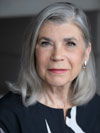There is nothing like being asked to chair a conference on the role of women in the government’s ‘Vision for Science and Society’ to focus the mind on this challenging topic. So before setting off for the Institute of Directors last week, I marshalled some thoughts in the hope of steering the day from lively debate to practical proposals.
The conference was organised by the UK Resource Centre for Women in SET, as one of a series to gather experience and recommendations on how to ensure that gender equality is included in government policy on science and society. (http://www.ukrc4setwomen.org/html/about-ukrc/influencing-policy/a-vision-for-science-and-society/)
The official report on the fascinating day will be posted shortly, but in the meantime, here are some personal musings on the three topics highlighted in the ‘Vision for Science and Society’ consultation paper produced by DIUS, the Department for Innovation, Universities and Skills.
A society excited by and valuing science
In 2008, my wonder that aircraft can fly, that clean water comes out of the tap and that I can speak to people around the world through a small piece of metal is probably regarded by many as childish naivety rather than awe at technological achievement. But let’s face it, there is a myriad of extraordinary ways in which our lives are enriched by science, but which too often generate unrealistic expectation rather than appreciation.
A society that feels confident in the use of science.
The complexity of scientific endeavour makes effective communication a challenge. Add in questions of ethics and practice and it is perhaps not surprising that public confidence can be tested. Now there is an additional challenge, caused by the growing division between religious and scientific belief. US vice presidential candidate Sarah Palin is the latest high profile proponent for teaching creationism side by side with Darwinian science in schools.
Extraordinary to think that it is nearly 400 years since Galileo was forced by the Inquisition to recant his theory that the Earth moves around the Sun, causing him great personal distress in balancing his religious commitment and scientific belief. But then it is only 16 years since the Vatican acknowledged that he was right. If you want to know more, read Dava Sobell’s book Galileo’s daughter.
A society that supports a representative, well-qualified scientific workforce.
It is paradoxical that despite the liberating influence of science, engineering and technology on women’s daily lives, that so few choose to study or work in the disciplines that have created that freedom. The need to improve advice and opportunities offered to girls and young women, together with realistic working conditions and effective career development remains paramount.
At a smart gathering of legal eagles last week it was rather depressing to be told by an articulate young woman that she couldn’t see anything interesting to do with her biology degree so she had opted to become a litigation lawyer.
On the plus side, just a few days earlier at an even more glittery evening at Claridges, it was a delight to sit at table with one of the regional winners of the Women in Property awards for young women studying built environment subjects.
Just starting on the third year of her architecture degree, Katherine Timmins told me what she did when faced with no practical careers advice or help from her school in identifying how to take up her chosen career path., "I just went on the web and sorted it out for myself," she said. An excellent role model in the making.
Friday, 10 October 2008
Subscribe to:
Post Comments (Atom)




No comments:
Post a Comment